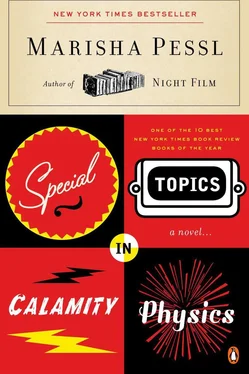Our dinner guest was nothing more than a cavity of reverential silence by the time I served coffee. His mouth was always open. His eyes resembled harvest moons. (If it’d been 1400 B.C. there was a chance he’d have crowned Dad leader of the Israelites and asked him to lead the way to the Promised Land.)
“Thank you, Dr. Van Meer,” he said as he was leaving, vigorously shaking Dad’s hand. “It’s been a — a pleasure. Everything you talked about — it — it was informative. I’m honored.” He turned to me, blinking in surprise, as if he was seeing me for the first time all evening. “It was a privilege to meet you as well. I look forward to seeing you again.”
I never did see him again, nor any of the others. For these colleagues, the Van Meer dinner invitation was like Birth, Death, the Senior Prom, a once in a lifetime event, and though there were enthusiastic promises of some future rendezvous shouted into the cricketed night as Teaching Assistant to Poetic and Narrative Forms dizzily lumbered to his car, in the ensuing weeks, Dad’s kind always withdrew into the concrete corridors of the University of Oklahoma at Flitch or Petal or Jesulah or Roane, never to emerge again.
Once, I asked Dad why.
“I don’t think the man’s presence was titillating to the degree that I wish to put myself through a repeat performance. He was neither dope, money nor jiggy with it,” he said, barely glancing up from Christopher Hare’s Social Instability and the Narcotics Trade (2001).
I found myself thinking about the story of Tobias the Damned quite often, in particular, when Jade drove me home after the Christmas Cabaret. Whenever anything strange happened, even the most trivial of occurrences, I found myself sort of going back to him, secretly afraid with just a little heave-ho I might turn into him — by my own fear and nervousness, setting off some awful spiral of misfortune and misery, thereby severely disappointing Dad. It’d mean I’d missed every one of the principles of his beloved Determination Theory, with its extensive section on handling emergencies. (“There are very few men who have the shrewdness to think and feel beyond the commotion of the present moment. Try, ” he commanded, recapitulating Carl von Clausewitz.)
As I walked up the lighted path to our porch, I could think of nothing I wanted to do more than forget Eva Brewster, Charles Manson, everything Jade had told me about Hannah, and simply disintegrate into bed, in the morning, maybe curl up next to Dad with The Chronicle of Collectivism . Maybe I’d even help him trek through a few student essays on future methods of war or have him read aloud The Waste Land (Eliot, 1922). Normally I couldn’t stand it — he did it in a very grandiose way, channeling John Barrymore (see “Baron Felix von Geigern,” Grand Hotel ). But now, it seemed like the perfect antidote to my gloom.
When I opened the front door and walked into the foyer, I noticed the lights were still on in the library. I quickly tucked the Blackbird book into my backpack, still slumped next to the stairs where I’d heaved it Friday afternoon, and hurried down the hall to find Dad. He was in his red leather armchair, a cup of Earl Gray tea on the table next to him, head bent over a legal pad, doubtlessly scribbling another lecture or an essay for Federal Forum . His illegible handwriting tangled down the page.
“Hi,” I said.
He glanced up. “Know what time it is?” he asked pleasantly.
I shook my head as he checked his watch.
“One twenty-two,” he said.
“Oh. I’m sorry. I—”
“Who was it that dropped you off?”
“Jade.”
“And where is Joe Public?”
“He’s — well, I’m not sure.”
“And where is your coat?”
“Oh, I left it. I forgot it at the—”
“And what in God’s name did you do to your leg? ”
I looked down. Blood had crusted around a cut on my shin, and my stockings had seized the opportunity to Go West, Young Man, ripping all the way up and around my leg, staking a claim somewhere in my shoe.
“I skinned it.”
Dad slowly removed his reading glasses. He placed them delicately on the table next to him.
“We’re through here,” he said.
“What?”
“Finito. Kaput. I’ve had enough of the deceit. I’ll tolerate it no longer.”
“What are you talking about?”
He stared at me, his face calm as the Dead Sea.
“Your fabricated Study Group,” he said. “The flagrant bravado you’ve cultivated when it comes to lying, which, to be frank, is more than a little pedestrian in its execution. My dear, Ulysses is an implausible choice for a study group in a secondary institution, however academically progressive. I think you might have done better with Dickens.” He shrugged. “Austen perhaps. But as you’re standing there in stunned silence, I’ll go on. The returning at all hours. The running around town like a hairless stray dog. The alcoholic binges, which, granted, I have no proof of, but can infer with little difficulty from the innumerable tales of America’s wayward youths saturating the airwaves and those unattractive caves around your eyes. I have said little, every time you so eagerly ran out of that door resembling a Cocoa Puff, wearing what the freethinking world would unanimously identify as a piece of Kleenex, because I assumed —unwisely it seems — that given the advanced degree of your education, you’d eventually come to the realization at the end of this hootchy-cootchy-with-the-ho-dawgs game, that these friends of yours, these puppy fats with whom you choose to pal around, are a waste of time, their thoughts about themselves and the world, stale. Instead, you seem to be suffering from a severe case of blindness. And poor judgment. I have to step in for your sake.”
“Dad—”
He shook his head. “I’ve accepted a position at the University of Wyoming for next term. A town called Fort Peck. One of the best salaries I’ve seen in years. After your final exams next week, we’ll orchestrate the move. You can call Harvard Admissions on Monday and notify them of the change of address.”
“What?”
“You heard me quite well.”
“Y — you can’t do this.” It came out a shrill, quivering whine. And it’s embarrassing to admit, but I was trying not to cry.
“And that is precisely my point. If we’d had this conversation a mere three or four months ago you would have recognized this as an opportunity to quote Hamlet . ‘O! that this too too solid flesh would melt / Thaw and resolve itself into a dew.’ No, this town seems to have affected you like television on Americans. It’s turned you into a side order of sauerkraut.”
“I won’t go.”
Thoughtfully, he twisted the cap on his ink pen. “My dear, I understand in full the melodrama that is about to transpire. After you inform me you’re running away to go live at the Dairy Queen, you’ll go to your room, sob into your pillow that lahf ain’t fair, throw things — I suggest socks; we’re renting — tomorrow you’ll refuse to speak to me, a week from today you’ll have fallen into a pattern of one-word replies and amongst your Peter Pan playas you’ll refer to me as the Red Mafia, one whose life’s sole intent is to reduce to rubble your every chance at happiness. This pattern of behavior will doubtlessly continue until we blow this here town, and after three days in Fort Peck, you’ll be speaking again, albeit between eye rolls and grimaces. And in a year, you’ll thank me. Tell me it was the best thing I ever did. I thought by having you read The Annals of Time we’d circumvented such sludge. Scio me nihil scire. But if you still insist on putting both of us through this tedium, I suggest you get the ball rolling. I have a lecture to write on the Cold War and fourteen research papers to grade, each penned by a student with no concept of irony.”
Читать дальше












